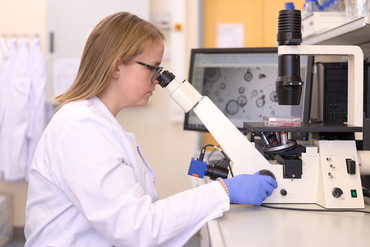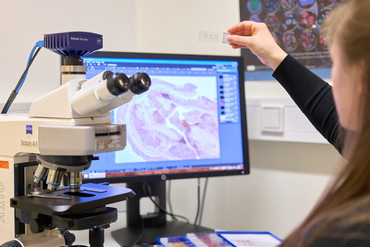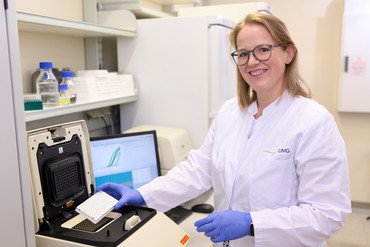Research topics Schulz-Heddergott lab
Department of Molecular Oncology
Targeting of stress response pathways in gastrointestinal cancers: The HSF1-HSP90 system

A prerequisite for tumorigenesis is the stabilization of proteins by the HSP90 chaperone systems, preventing aberrant oncogenic proteins from aggregation. HSF1 governs the synthesis of chaperones as a master transcription factor in response to diverse stresses. Since cancer cells experience cumulative stresses during tumorigenesis, HSF1 is activated to increase the levels of chaperones and to avoid the accumulation of aberrantly folded proteins. Recently, we found that wildtype p53 actively represses the HSF1-regulated system in colorectal cancer (CRC). Our lab aims to identify further stress signaling pathways that influence HSF1-mediated tumorigenesis. In line, we explore the inhibition of HSF1 and HSP90 as selective therapeutic strategies against cancer cells. Within all our projects we use preclinical models including patient-derived organoids, experimental animal studies and patient samples to fulfil adequate standards for translational research.
Identification of distinct pathway regulations by specific p53 mutants in colorectal (CRC) and pancreatic cancer (PDAC)

The tumor suppressor p53 is subject to the most frequent mutations across all cancer species. We explore gain-of-function (GOF) activities of specific missense p53 mutants (misp53) in gastrointestinal cancers. Importantly, some p53 missense mutants can gain GOF activities that are not automatically shared by other mutants. A prerequisite for misp53 GOF activities is the protein stabilization of p53 mutants by the HSP90 system. Recently, we discovered that the misp53R248Q/W GOF mutant increases tumor growth and invasiveness in CRC and PDAC. We proceed our studies within the Clinical Research Unit 5002 ‘Deciphering Genome Dynamics for Subtype-specific Therapy in Pancreatic Cancer’.
HSP90-stabilized cytokines as regulators of the tumor microenvironment

Our lab identified MIF (macrophage migration inhibitory factor) as a new HSP90 client to promote cancer progression. MIF, originally a pro-inflammatory cytokine, is specifically elevated by binding to HSP90 in several cancers. In colitis-associated CRC, stabilized epithelial MIF supports tumor growth by macrophage recruitment and increased angiogenesis. HSP90 inhibition strongly decreases MIF levels and tumor growth. Since MIF acts on the tumor microenvironment, we now investigate inducible tissue-specific MIF ablations in genetically engineered mice and organoid cultures as model systems of gastrointestinal cancer.
Exploration of disordered proteins during cancer progression and as vulnerability in cancer therapies

Failures in the HSF1-HSP90 system can lead to intrinsically disordered, aggregated proteins and are associated with neurodegenerative diseases. More recently, evidence emerged that protein aggregates also promote human malignancies. In collaboration with the Max Planck Institute for Multidisciplinary Sciences, Department of NMR-based Structural Biology, we explore the vulnerability of aggregated proteins in gastrointestinal cancers.